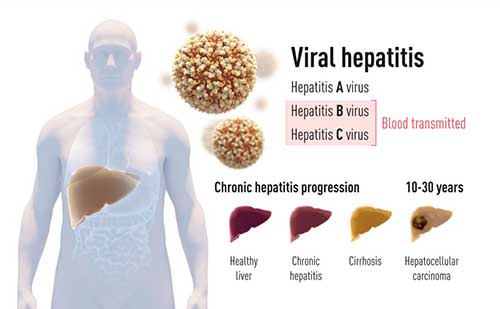The 2020 Nobel Prize in Physiology or Medicine was awarded to Harvey J. Alter, Michael Houghton and Charles M. Rice for their discovery of the hepatitis-C virus. This virus is responsible for causing liver cirrhosis and liver cancer all over the world. HCV was first identified in 1989 as the principal cause for post-transfusion non-A, non-B hepatitis and an estimated 130–170 million people worldwide (2–3% of the population) are currently infected. According to the 2017 Global Burden of Disease study, India had 4.83 lakh new HCV cases in 2014.

The Hepatitis-C Virus:
The virus spreads intravenously or through punctures caused by syringes. It can also be transmitted sexually. Most patients do not develop symptoms, but there is always a possibility of some developing fever, fatigue, and jaundice. Unfortunately, for around 85% of the patients, the infection does become chronic.
HCV does not often cause visible scars or debilitations. As a result, the public does not seek treatment and the healthcare personnel does not refer them for treatment. As a chronic HCV infection rages internally with only a few overt symptoms, it’s aptly been called a “silent epidemic”.
By 1979, smallpox had been eradicated globally, and polio is close behind, with only three polio-endemic countries remaining worldwide. This has been possible due to the development of vaccines & effective implementation by healthcare systems all over the world. But this is not the case with the hepatitis-C virus. The HCV has a diverse genetic make-up and the creation of a single vaccine to effectively contain all the variants has not been possible till now. However, research continues, and vaccines might soon become available for all the variants.
Significance of This Nobel Prize:
Highly sensitive blood tests for the virus are now available and this has made possible elimination of post-transfusion hepatitis in many parts of the world. There is also rapid development in antiviral drugs directed at hepatitis-C. For the first time in history, the disease can now be cured, raising hopes of eradicating the hepatitis-C virus.
The Paradigm Shift:
Until recently, treating the HCV infection meant being injected with a combination of drugs – pegylated interferons (a further combination of three drugs) plus ribavirin. But since 2014, with the development of directly acting anti-viral (DAA) agents, the scenario has dramatically changed. But of course, for the treatment to have maximum effect, it is necessary to educate the people, involve the community and make health care accessible.
It’s indeed the right time for us to unite to eradicate this virus with the currently available “all oral anti-viral medications”. The currently available medications have a cure rate of 90%.
The success of HCV eradication will eventually be visible in the number of lives it manages to save.

Dr S.Vadivel Kumaran, MD (Gen.Med),DM(Med.Gastro),
Consultant Interventional Medical Gastroenterologist & Hepatologist,
Kauvery Hospital, Chennai

